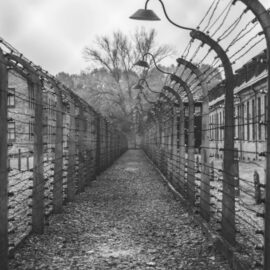

This article is an excerpt from the Shortform summary of "The Hiding Place" by Corrie ten Boom. Shortform has the world's best summaries of books you should be reading.
Like this article? Sign up for a free trial here .
What happened to Corrie ten Boom after the war? When was she released and what did she do with her freedom?
Corrie ten Boom after the war was given a release, but it took some time for her to actually get home. Read about her journey and the clerical error that saved her life.
Freedom for Corrie ten Boom After the War
Mere days after Betsie’s death, Corrie was ordered to stand to the side during roll call and report to the administration barracks. When she arrived, the clerk stamped her papers, which bore the words “CERTIFICATE OF DISCHARGE.” Next, she was handed a rail pass that would take her out of Germany and back into Holland. This mean that Corrie ten Boom after the war would be at home in Haarlem.
Corrie was stunned—her ordeal was really coming to an end! But before she could walk out of the camp, she had to submit to one more humiliating, dehumanizing medical inspection. Much to her dismay, the doctor immediately looked at the swelling in her legs and feet and declared her unfit for release. Apparently, she was suffering from edema. Before she could walk out of Ravensbruck, Corrie would need to report to the camp hospital—the same place where her sister had died.
The Hospital
For Corrie ten Boom after the war, the hospital was a dreadful place, filled with dying and suffering women, languishing from untreated injuries and illnesses, many of them delirious from the combined effects of fever, malnutrition, and neglect. Some of the women had been on transport trains that had been hit in Allied bombing raids and were suffering from third-degree burns and severed limbs.
The nurses took little care for their patients, often mocking their tortured cries or yelling at them to shut up and stop complaining. On Christmas Eve 1944, Corrie’s first night in the hospital, four women fell from the top bunks onto the floor, where they died from shock. The sounds of pain rang throughout the ward. Corrie did what she could to ease the suffering, bringing bedpans to the patients who were too weak to make it to the ward’s filthy latrine.
One night, Corrie saw that the bedpans she had laid out for the patients were missing. She discovered that two Hungarian gypsies had stolen them, secreting them under their cots to save themselves the trip to the latrine. Corrie pleaded with these women to return them so that everyone could use them, but seemingly to no avail. That night, one of the gypsies threw her bandage at Corrie’s face—a bandage that had been used to cover this woman’s gangrenous wounds. Traumatized and disgusted, Corrie contemplated giving up on the bedpans, but she ultimately realized it was her Christian duty to help those in greater need. She dutifully went under the gypsies’ beds to retrieve them and share them with the other patients.
Release
Finally, at the end of December, the doctors cleared Corrie for release. She was given back the possessions she’d been arrested with and, on New Years Day 1945, was placed on a train bound for Berlin. Corrie ten Boom, after the war and years later, learned that her release had been the result of a clerical error—the rest of the women at the hospital in Ravensbruck were murdered in the gas chambers a mere week after Corrie left the camp.
On her train journey, Corrie saw the devastation that war had wrought on Germany. For Corrie ten Boom, after the war, there was devastation and suffering left behind. The towns and countryside lay in bombed-out ruins. The Nazi menace, and the global war it had provoked, had wrought unimaginable physical destruction on Europe. After making her way to Berlin, she boarded another train bound west, for Holland. During the random stops in bombed-out rail stations, Corrie would sleep in deserted cafes and waiting rooms. At last, her train made its way across the border into Holland.
The train only took her as far as the Dutch border town of Groningen. When she got off the train, she had nowhere to go. With her remaining strength, Corrie limped to a hospital, where a kindly nurse took her in. Recognizing that Corrie was suffering from severe malnutrition, this woman gave her a hot bath and shared with her the small amount of food she still had left. After nearly a year in prison and in the camps, Corrie was deeply grateful and joyous to be treated with kindness and humanity. The staff at the hospital also managed to get word to Willem and Nollie that Betsie had died and that Corrie was on her way home.
Corrie ten Boom After the War: A New Mission
Upon her return, Corrie found that she had no more energy for underground work. She sensed that God had a different calling for her. She began preaching in the streets of Haarlem in early spring 1945, while the city was still under occupation. Corrie delighted in sharing the message of the unconquerable power of Christ’s love. Corrie ten Boom after the war continued her unshakable faith as she had done throughout the difficult years.

———End of Preview———
Like what you just read? Read the rest of the world's best summary of Corrie ten Boom's "The Hiding Place" at Shortform .
Here's what you'll find in our full The Hiding Place summary :
- Why devout Christian Corrie ten Boom decided to stand up to the Nazi occupation
- How ten Boom and the Jewish neighbors she was hiding were caught
- How ten Boom survived the concentration camp and left with even stronger faith






